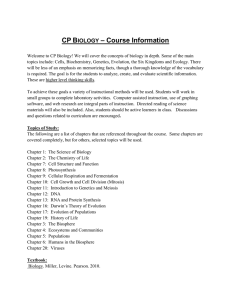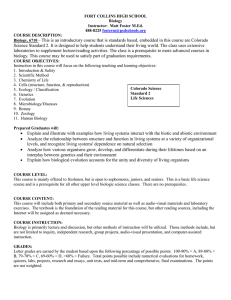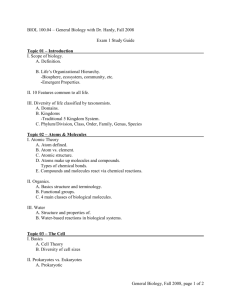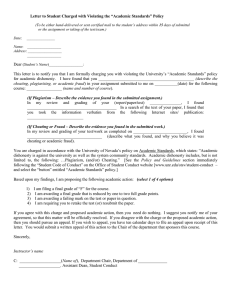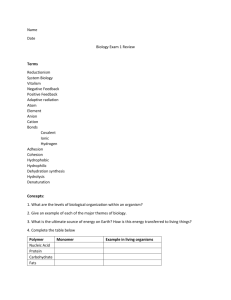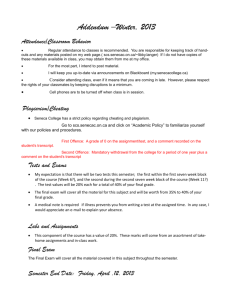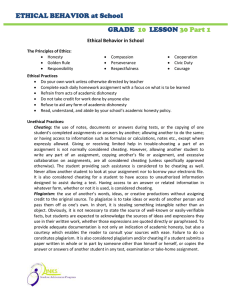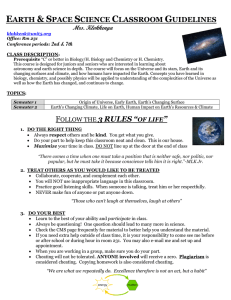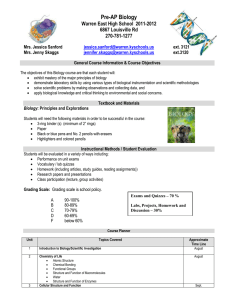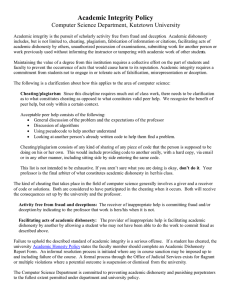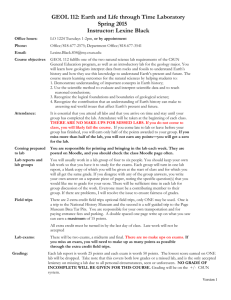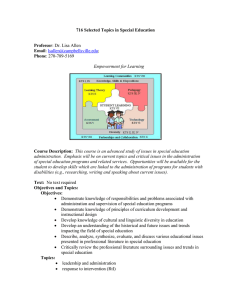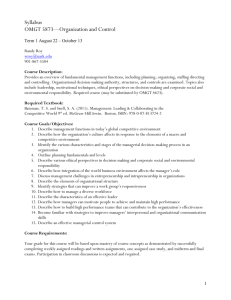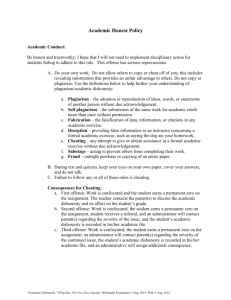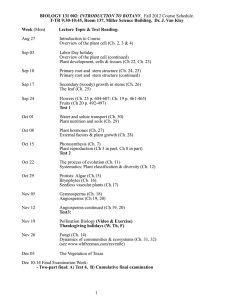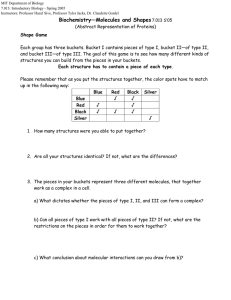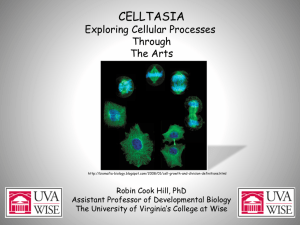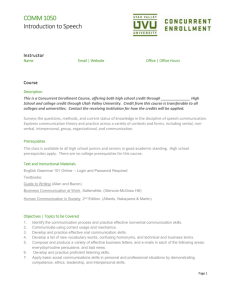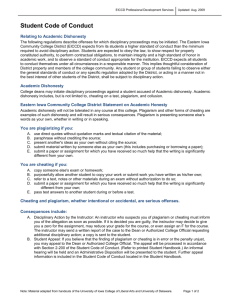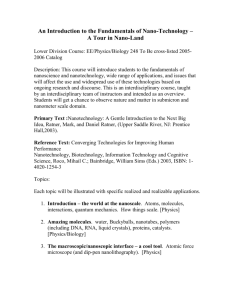BIOTECH BIOL 161 SYLLABUS Fall 2015
advertisement
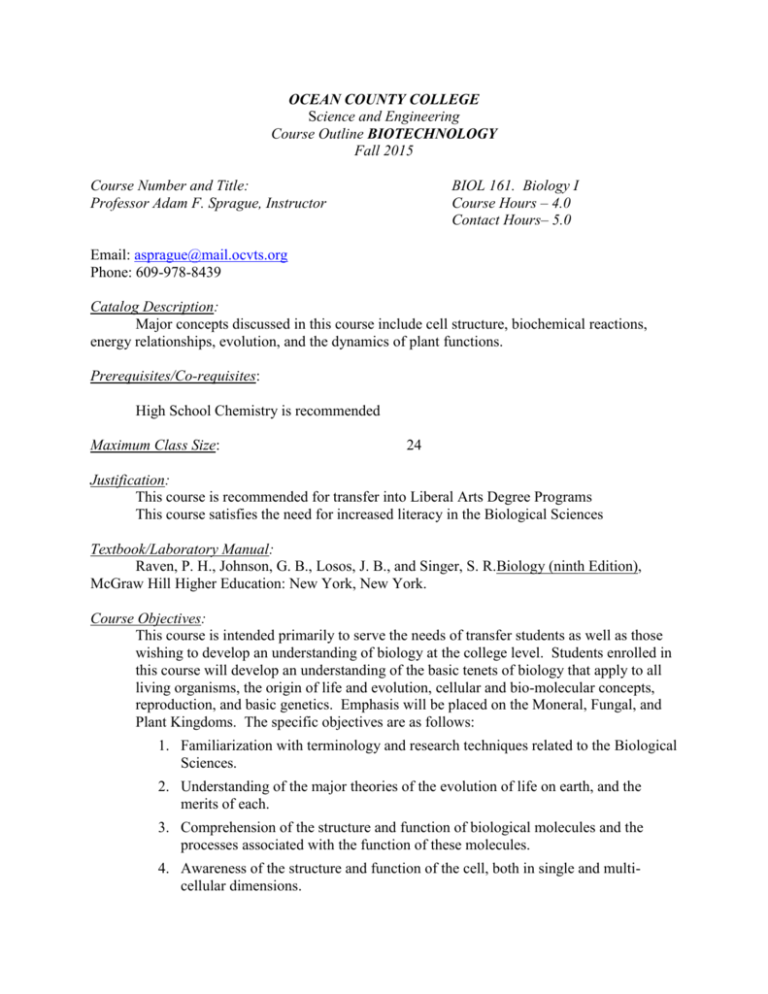
OCEAN COUNTY COLLEGE Science and Engineering Course Outline BIOTECHNOLOGY Fall 2015 Course Number and Title: Professor Adam F. Sprague, Instructor BIOL 161. Biology I Course Hours – 4.0 Contact Hours– 5.0 Email: asprague@mail.ocvts.org Phone: 609-978-8439 Catalog Description: Major concepts discussed in this course include cell structure, biochemical reactions, energy relationships, evolution, and the dynamics of plant functions. Prerequisites/Co-requisites: High School Chemistry is recommended Maximum Class Size: 24 Justification: This course is recommended for transfer into Liberal Arts Degree Programs This course satisfies the need for increased literacy in the Biological Sciences Textbook/Laboratory Manual: Raven, P. H., Johnson, G. B., Losos, J. B., and Singer, S. R.Biology (ninth Edition), McGraw Hill Higher Education: New York, New York. Course Objectives: This course is intended primarily to serve the needs of transfer students as well as those wishing to develop an understanding of biology at the college level. Students enrolled in this course will develop an understanding of the basic tenets of biology that apply to all living organisms, the origin of life and evolution, cellular and bio-molecular concepts, reproduction, and basic genetics. Emphasis will be placed on the Moneral, Fungal, and Plant Kingdoms. The specific objectives are as follows: 1. Familiarization with terminology and research techniques related to the Biological Sciences. 2. Understanding of the major theories of the evolution of life on earth, and the merits of each. 3. Comprehension of the structure and function of biological molecules and the processes associated with the function of these molecules. 4. Awareness of the structure and function of the cell, both in single and multicellular dimensions. 5. Comprehension of the taxonomical and evolutionary relationship of all living things; specifically the evolution and development of bacteria, fungi, and plants. 6. Application of scientific principles – research and theory – through the review of current information published in scientific literature and web sites.. Overview of Course Content I. Introduction to Biological Science Scientific Methods and Experiments Ecology, Taxonomy, and Evolution Theories of the Origin of Life on Earth II. An Overview of Inorganic and Biochemistry Atoms, the Periodic Chart, Bonding, Isotopes, Elements Hydrocarbons, Functional Groups, and Carbohydrates III. Biological Molecules Lipids, Proteins, Polymerization, and Proteins Nucleotides, DNA, and RNA Enzymes and Enzyme Specificity IV. The Cell – Structure and Function The Origin of Cells – Cell History Cell Membranes Cell Structure – Organelles, Osmosis and Diffusion Mitosis and Meiosis Sexual .Asexual Reproduction, and Gametes Cell Respiration and Metabolism Photosynthesis V. Plant Structure and Function The Kingdom Plantae Movement onto Land and Bryophytes Tracheophytes and Tracheophyte Divisions Angiosperms, Gymnosperms, Flowering Plants Fruit, Seeds, Plant Tissues, and Plant Structure Root, Stem, and Leaf Structure Instructional Delivery Methodology The methods of instructional delivery that will be employed in this course include class lecture, discussion, and library/web-based research. In addition, laboratory sessions will stress a tactile/discovery approach to scientific investigation. 2 Student Assessment Methodology: Grades will be based on a point system. Each assignment, lab, quiz, and test will be worth a predetermined amount of total points. Students will earn a percentage based on the total correct out of the total amount of points possible. Example: if a particular test was worth a total of 70 points and the student earned 62 correct out of 70, we would divide 70 into 62 and multiply that number by 100. 62/70=.885 x 100 = 89%. Grades will be based on a variety of criteria including: Tests and Quizzes Lab Activities and Weekend Assignments and Investigations Class Projects and Presentations Homework Assignments Your grade on your MATES transcript will be the usual numerical grade. On your OCC transcript a letter grade will be given using this conversion: 90 – 100 A 87 – 89 B+ 80 – 86 B 77 – 79 C+ 70 – 76 C 66 – 69 D Below 65 F Course Requirements: It is assumed for any reason, if a student is absent for an exam or laboratory session, it is the student’s responsibility to contact the instructor before the missed class if possible to make arrangements to for a make-up session. Examinations: Examination format will include multiple choice and true/false questions, which will your knowledge of material presented in lecture, readings, and discussion. Laboratory Requirements: The laboratory component of this course has specific requirements. First, it is important to maintain a clean, safe working environment; therefore the following safety rules must be observed: 1. No food or drink is allowed in the laboratory. 2. No sandals or open-toed shoes are allowed in the laboratory. 3. Hand washing and other hygienic methods must be employed to ensure that there is no contamination to each other or to the specimens. 4. Microscopes must be cleaned before they are returned to the microscope cabinets. 5. All waste must be disposed of in the appropriate receptacle. 6. The laboratory must be cleaned and all instruments returned to their appropriate storage container before the class is dismissed. 3 General Policy Statements: Academic Honesty: “Academic dishonesty includes, but is not limited to plagiarism, cribbing and cheating on examinations, quizzes, class projects or papers. Any student aiding another student in any form of dishonesty is considered equally guilty.” OCC Student Handbook, pg. 35. Cheating is not acceptable and will result in a grade of 0 for that examination and will be turned over to the appropriate College source for disciplinary action. Please review policy #5180 in the student handbook for the penalties associated with plagiarism and cheating. Disclaimer: Reasonable changes to this course outline may be made exclusive of course requirements, course calendar, and grading procedures. 4
